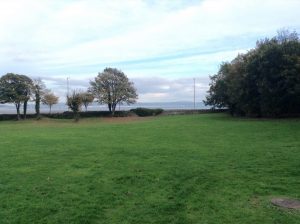Support us from £3/month
We deal with almost 1000 cases a year assisting communities, groups and individuals in protecting their local spaces and paths in all parts of England and Wales. Can you help us by joining as a member?
We have signed the Placemaking Wales Charter, pledging to support its objectives. These include a commitment to support the creation of high-quality places across Wales for the benefit of communities.
The charter has been developed by the Welsh government and the Design Commission for Wales in collaboration with the Placemaking Wales partnership. It has more than 50 signatories.
The charter aims to provide a common understanding of the range of considerations which go into ‘Placemaking’ to secure good-quality places where people live.

Castle Acre view towards Mumbles Rd, Swansea, now protected as a village green.
The charter’s six principles are to involve the local community in shaping the design of local places; to prioritise walking, cycling and public transport modes and avoid dependence on private vehicles; to make streets and public spaces welcoming, safe and inclusive; to use land efficiently to reduce the need to travel; to ensure places have a range of purposes to support community development, and to encourage communities to value and respect their surroundings.
Says Nicola Hodgson, one of our case officers: ‘The pandemic has highlighted the importance of accessible greenspace for well-being and the multiple benefits it delivers. We welcome the commitments to green infrastructure and accessible greenspace in Planning Policy Wales guidance and the National Development Framework Future Wales 2040.
‘The society recently launched its Open Space Charter for Wales to press for pro-active work to expand, enhance and maintain the green space that is so vital for the welfare of communities.
‘The Welsh Government has the right tools in place with the Environment Act 2016 and the Well-Being of Future Generations (Wales) Act 2015, but there is more to be done. We call for green space targets for new developments and green travel routes, and we want to see environmental and social factors embedded in decision making.
‘Unfortunately, England is travelling in the opposite, wrong, direction. The Planning White Paper makes local open spaces more vulnerable to development and provides inadequate protection for open space or public rights of way. The Environment Bill has been delayed and will not now be law before the Brexit transitional period ends on 31 December, leaving serious holes in environmental protection’, declares Nicola.
